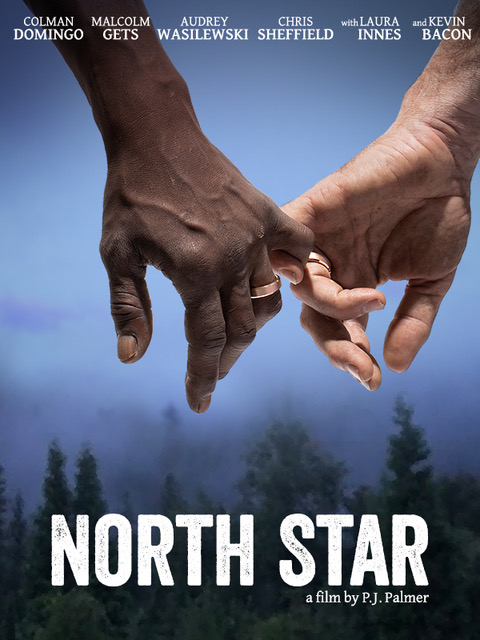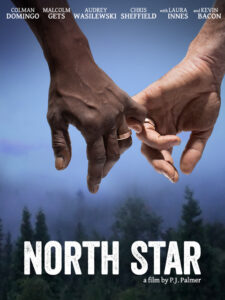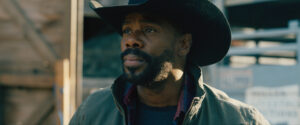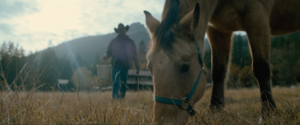
Oscar Qualifying Short Film Review “North Star”
WATCH THE TRAILER HERE
First, the Recap:
The ever-present struggle for identity. This current age sees such an upheaval in what it is to be defined, categorized, and labeled that finding one’s true nature seems almost impossible. Even when there’s absolutely NO question about who you are and/or strive to be, it appears resistance, misconception, bigotry, and utter hate choose to remain obstacles not just to face, but to try to stand one’s ground against and conquer. In the wondrous beauty of open sky country and soaring mountains, a rancher named James (Colman Domingo) resides with his illness-stricken husband Craig (Malcolm Gets). Dealing with the normal rigors of the ranching existence, lovingly caring for Craig, and a pile-up of financial circumstances that usher in an equally crushing decision, things only get worse when a visit from Craig’s sister Erin (Audrey Wasilewski) further cements James’ pondering of isolation, impoverished living, and the specters of zealotry, a maligned lifestyle, and familial judgement. But, can abiding love from the heart overcome it all?
Next, my Mind:
The staggering, unforgiving weight of prejudice, unveiled anger, desperation, and seemingly endless search for true solace clashes with the equal potency of the stalwart heart, unwavering fortitude, and the soul to firmly support those we so deeply love no matter the cost to create the foundational basis for this 30-minute Oscar-qualifying short film effort from writer/director/producer P.J. Palmer, producers Ryan Haffey and Emily Palmer, executive producers Andrew Carlberg, Colman Domingo, Caroline Metz, Lindsey Moreno, Heather Morris, and Corey Reynolds plus co-executive producers Cynthia Hallman and Zelda Hallman. For this critic, who’s has made it plainly known in past instances and reviews that efforts centered around LGBTQ topics are not a personal preference, once more readily concedes that artistry trumps orientations and provides us a tale that is believable, fully relevant to our modern times, and completely, utterly human. An underlying cord that addresses racial diversity is present as well, very apropos as well even if not the central idea being heralded here.
Presenting a narrative that focuses on a rancher whose life is being upended by the realities of a sick husband, a pestering, candidly critical sister-in-law, and the ugliness of not being able to fully grasp the freedom of life and lifestyle he’s chosen, it is a raw and unflinching viewpoint of the labors of caretaking, the harshness of religious fanaticism, and the unquenchable yearning to just have the cornerstone of genuine love as the ultimate guide through it all, regardless of how everything else appears on the surface. How we as people choose to handle hardship and criticism, especially when it forcibly causes us to likewise encounter those who so drastically oppose our perspectives, is paramount to then discovering the true peace and amity we desire. I guess this is to say that the concept of recognizing, acknowledging, but also ACCEPTING that differing opinions and attitudes will forever be a part of our interactions with others CAN be experienced WITHOUT the monsters of malice, regret, and/or reminders of our struggles.
The film very deftly explores all of these notions and does so in a way that, granted, might be totally (perhaps sadly) relatable to some, possibly agitating and provocative to others, but all the while eliciting an atmosphere of influential necessity to contemplate our own situations and challenges just like, albeit mainly in principle or directly, the characters portrayed here confront. Additionally, I also feel this is what I mean when mentioning that the thematic bends here transcend the baseline ones as stated above earlier and offer us applicability and grounded, realistic moral lessons that anyone can, no matter what lifestyle or beliefs you hold, can find value in. Visually the film gives us some wonderfully vivid imagery both of the supreme natural surroundings of the ranch to the frank intimacy that exists between James and Craig, done so in a manner that is a pure, stirring reflection of both the immutable connection and adoration they have to the toll stress from outside factors is taking on them, often said without words or very few. An atmospheric music score, consisting mainly of piano, adds to the ambiance with well-orchestrated aim.
Domingo is a solid force to be reckoned with here, with a purposefully subdued delivery and demeanor that doesn’t lack at all in needed intensity but also doesn’t sacrifice the softer heart being conveyed as well through his portrayal of James, a rancher who feels he’s on the edge of a cliff but doggedly refuses to allow himself to go over. Longing to remain in the remoteness of the home he shares with his illness-stricken husband whom he needs to care for on every level, James’ outlook remains one of hope despite the building frustrations he feels about their overall plight. When his sister-in-law arrives to check on her brother’s well-being, James is then faced with the rigid and undeviating judgement and arguments she brings with her, and it becomes a test of wills that will either break him or cause him to dig in deeper to his steadfast beliefs and the nucleus of love he harbors for who he is and the lifestyle he’s chosen. It’s a heartfelt, passionate performance throughout that speaks volumes to Domingo’s ability to breathe feasible life into a character.
Gets offers an entirely different magnitude of acting prowess that’s so overtly integral to sell us on his role as Craig, James’ husband and a man suffering from a debilitating malady that requires consistent, constant, and intensive care, which James provides without hesitation. While Craig can barely utter sounds much less speak, his eyes and facial expressions reveal so clearly everything from pain to the absolute adoration he has for James, an affecting illustration of devotion, gratitude, but also maybe some regret that he must put his significant other through such a tedious daily routine to maintain a semblance of “active” life. But again, James does this without question, and when Craig is helplessly placed in instances with his sister via conversation or otherwise that berate and belittle his lifestyle with James, the overwhelming strain of it all is SO evident on Craig’s countenance, and Gets, with beautifully executed, highly emotive impact, makes you feel every single iota of it with such quiet yet inwardly fiery resolve.
Wasilewski brings the antagonistic aura to the proceedings with bravado and intentionality via her appearance as Erin, Craig’s sister who’s nursing skills aid in Craig’s care but also seem to allow her an excuse to end up arriving to bring up her disapproval of James and her brother’s lifestyle, both in a sense of where and how they live as well as their chosen orientation. It then becomes apparent that Erin’s goal is to also find ways to stand behind what she feels is justifiable religiosity to the point of relentless intolerance and discrimination in the name of God, taking every opportunity to try and convince her unable-to-defend-himself brother’s condition to both visually and verbally attack his choices and try to convince him of his need to be set free from his sins. It’s a tragic and heartbreaking behavior to witness and creates a character you want to hate, yet you ALSO want to potentially understand her general outlook on things and why she believes it. It’s a fantastic performance that so magnificently befits the narrative.
Primary supporting roles arrive through a very reliable gem of a film veteran Kevin Bacon as Dr. Owen Broderick, a televangelist whose station Erin turns on during her visit and whose highly outspoken ideas and feelings about the gay lifestyle are quite clear, an example of the condemnatory approach Erin believes in as well. Another quality veteran, Laura Innes, appears as Broderick’s wife Jess, who’s own level of “niceness’ on the surface is only a facade to full agreement with her husband. Chris Sheffield also appears as another local rancher, Mike, who comes to take away a key remaining element at James’ ranch that signals just how desperate he is to try and stay above water, much to the chagrin of Erin. Other supporting appearances are made by Arlene Santana, John Burke, Serene Branson, Darius De La Cruz, Bethany Arrington, The Horse Butterscotch, Angie Beauregard, Kevin Quinn, Donna Smith, and Alex Verde.
So, in total, “North Star” flies high on the acute, compelling pertinency of its primary themes but then elevates above that with effective and engaging poignancy in making us realize the worthy-to-consider, grander objective declaring that no matter whether you agree with a particular livelihood/lifestyle or not, any arguments and differences can truly be addressed so much more constructively and lovingly, minus narrow-mindedness and animosity, so as to affirm that while we might all have differing opinions on any given thing, why does this mean we have to be so blatantly polarized and disconnected as PEOPLE because of it?
As always, this is all for your consideration and comment. Until next time, thank you for reading!





